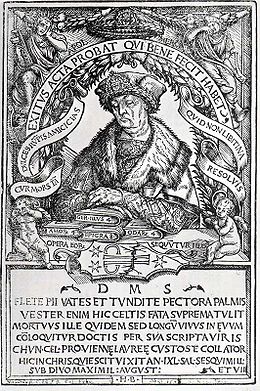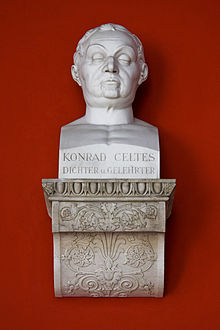- Conrad Celtes
-
Conrad Celtes (or Celtis), also Konrad Celtis and Latin Conradus Celtis (February 1, 1459 – February 4, 1508), was a German Renaissance humanist scholar and Neo-Latin poet.
Contents
Life
Born at Wipfeld, near Schweinfurt in Lower Franconia under his original name Konrad Bickel, Celtes pursued his studies at Cologne and the Heidelberg. While at Heidelberg, he received instruction from Dalberg and Agricola. As customary in those days for humanists, he Latinized his name, to Conradus Celtis. For some time he delivered humanist lectures during his travels to Erfurt, Rostock and Leipzig. His first work was titled Ars versificandi et carminum (The Art of Writing Verses and Poems, 1486). He further undertook lecture tours to Rome, Florence, Bologna and Venice.
The elector Frederick of Saxony approached the emperor Frederick III, who named Conrad Celtes Poet Laureate (Honored Poet) upon his return. At this great imperial ceremonial gathering in Nuremberg, Celtes was at the same time presented with a doctoral degree. Celtes again made a lecturing tour throughout the empire. Later he traveled to Kraków where, in 1488, he applied himself to mathematics, astronomy and the natural sciences and befriended many other humanists such as Lorenz Rabe and Bonacursius. He also founded a learned society, based on the Roman academies. The local branch of the society was called Sodalitas Litterarum Vistulana (the "Literary Society at the Vistula River").
In 1490 he once again went through Breslau (Wrocław) to Prague, capital of the Kingdom of Bohemia. Hartmann Schedel used Celtis' descriptions of Breslau in the Schedelsche Weltchronik (Nuremberg Chronicle). In Hungary, Celtis formed the Sodalitas Litterarum Hungaria ("Hungarian Literary Society"), later as Sodalitas Litterarum Danubiana to be based in Vienna. He made stops at Regensburg, Passau and Nuremberg (and probably Mainz). At Heidelberg he founded the Sodalitas Litterarum Rhenana ("Rhineland Literary Society"). Later he went to Lübeck and Ingolstadt. At Ingolstadt, in 1492 he delivered his famous speech to the students there, in which he called on Germans to rival Italians in learning and letters. This would later become an extremely popular address in sixteenth century German nationalistic sentiment.
While the plague ravaged Ingolstadt, Celtes taught at Heidelberg. By now he was a professor. In 1497 Celtes was called to Vienna by the emperor Maximilian I, who honored him as teacher of the art of poetry and conversation with an imperial Privilegium, the first of its kind. There he lectured on the works of classical writers and in 1502 founded the Collegium Poetarum, a college for poets. Celtes died at Vienna a few years later of syphilis.[1]
Overview
 Conradus Celtis
Conradus Celtis
Conrad Celtes' teachings had lasting effects, particularly in the field of history. He was the first to teach the history of the world as a whole. He started work on the Germania Illustrata with Germania generalis and De rigine situ, moribus et institutis Norimbergae libellus ("Booklet of structure, habits and institutions of Nuremberg"). He discovered and published the writings of Hroswitha of Gandersheim. Celtes also discovered a map of the military roads of the Roman Empire, the Tabula Peutingeriana, or Peutinger Table. He collected numerous Greek and Latin manuscripts in his function as librarian of the imperial library that was founded by Maximilian.
Conrad Celtes was more of a free-thinking humanist and placed a higher value on the ancient pagan, rather than the Christian ideal. His friend Willibald Pirckheimer had blunt discussions with him on that subject.
The Celtis-Gymnasium in Schweinfurt was named after Conrad Celtis.
References
- ^ Laurens p.405
Sources and further reading
- Pierre Laurens (ed.) Anthologie de la poésie lyrique latine de la Renaissance (Gallimard, 2004)
- Christopher B. Krebs: Negotiatio Germaniae. Tacitus’ Germania und Enea Silvio Piccolomini, Giannantonio Campano, Conrad Celtis und Heinrich Bebel, Vandenhoeck & Ruprecht, Göttingen 2005. (Hypomnemata, Bd. 158) Pp. 284. ISBN 3-525-25257-9.
- Jörg Robert: Konrad Celtis und das Projekt der deutschen Dichtung. Studien zur humanistischen Konstitution von Poetik, Philosophie, Nation und Ich, Tübingen 2003. ISBN 3-484-36576-5
- Hans Rupprich: Neue Deutsche Biographie, Band 3 Seite 181siehe auch Band 20, Seite 50 und 474, Band 22, Seite 601
- Walther Killy (Hrsg.): Literaturlexikon: Autoren und Werke deutscher Sprache, Bd. 2, S. 395, Bertelsmann-Lexikon-Verlag, Gütersloh u. München 1988–1991 (CD-ROM Berlin 1998 ISBN 3-932544-13-7)
- Pierer's Lexikon, Kluepfel, Aschbach.
- Catholic Encyclopedia.[1]
- Schäfer, Eckart (ed., trans.), Conrad Celtis: Oden/Epoden/Jahrhundertlied: libri odarum quattuor, cum epodo et saeculari carmine (1513). (Tübingen: Gunter Narr Verlag, 2008) (NeoLatina, 16).
External links
- Conrad Celtes in the German National Library catalogue (German)
- (1876) (in German). "Conrad Celtes". In Allgemeine Deutsche Biographie (ADB). 4. Leipzig: Duncker & Humblot. pp. 82.
- Friedrich Wilhelm Bautz (1975). Bautz, Friedrich Wilhelm. ed (in German). Conrad Celtes. Biographisch-Bibliographisches Kirchenlexikon (BBKL). 1. Hamm. cols. 967–969. ISBN 3-88309-013-1. http://www.bautz.de/bbkl/c/celtis_c_p.shtml.
- Bücher von und über Celtis bei der Staatsbibliothek zu Berlin
- Kurzbiographie
- Nachweise von Werken im Web
- Celtis in der Bibliotheca Augustana mit Porträts
- Bildnis-Holzschnitt von Dürer
- Conrad Celtes in the Aeiou Encyclopedia (German)
- Denkmäler des Wiener Poetenkollegs
- Der gekrönte Conrad Celtis und das Fichtelgebirge
- Conrad Celtis Protucius... Four cities of Germany
Categories:- 1459 births
- 1508 deaths
- 16th-century Latin-language writers
- German Renaissance humanists
- German scholars
- Lower Franconia
- Post-imperial Latin poets
- Renaissance Latin-language writers
- University of Heidelberg alumni
- Alumni of Jagiellonian University
Wikimedia Foundation. 2010.


